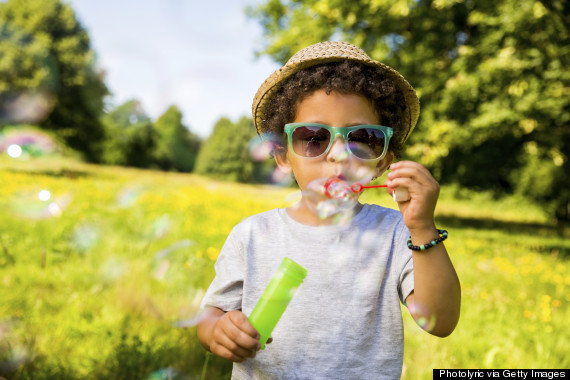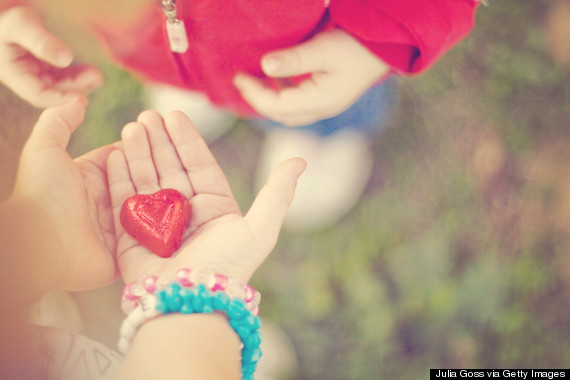
We may be fully-grown adults, taking on the world one corporate meeting and personal triumph at a time, but what if we were smarter as kids than we gave ourselves credit for?
Childhood is classified as the era where we're learning and growing so we can call ourselves knowledgeable by the time we've reached adulthood; however, kids are pretty intelligent in a lot of ways that adults aren't -- particularly when it comes to our health. In addition to conquering multiplication tables and strategizing lunch-box snack trades, we were also pretty intuitive when it came to our own well-being.
As we've grown older, somewhere along the way we may have lost these precious childhood ideals. We spend most of our time in front of a screen (a 2013 study found we're spending more than 5 hours per day with our devices) and in overdrive at work (job burnout is continually on the rise) rather than prioritizing our own happiness. The good news is, these wellness values were second nature to us as children -- and there's a way to get back to them as adults. In celebration of HuffPost's ninth birthday, below find important well-being lessons we had complete understanding of by the time we were 9 years old.
Prioritize playtime.

We often get nostalgic for the times we spent playing tag outside until the last ray of sun disappeared, but that devotion to outdoor activities is something we should consider revisiting as adults. When we spend time outside our vitamin D levels rise and we get more exercise, plus spending time surrounded by natural light can also help improve our concentration and make us happier. Our work can also benefit from taking a break in the great outdoors: staring at the color green -- much like the colors we see in nature -- has been linked to increased creativity.
Cultivate resilience.
If little kids had a mantra, it would be "fall seven times, stand up eight." When we were younger, we had this innate ability to jump right back into something, whether it was after a scraped knee or a dispute on the swing set. We didn't hold a grudge or ruminate over a negative experience -- and that attitude of resilience is something that can benefit our well-being as adults. According to psychologist Peter Kramer, joy isn't the opposite of depression -- instead, it's our ability to bounce back that counteracts the condition. When we face challenges with positive emotions, and learn to adapt to them, we're more likely to experience better psychological and physical well-being.
Indulge in a little friendly competition.

Nobody likes a super competitive person, but channeling those days of racing your friends down the street (and then moving on quickly to the next activity) could be beneficial to us as working adults. According to a report by The New York Times, scientific research has shown that certain situations containing a little healthy competition can actually boost happiness. This same type of competition -- one that contains a sense of childlike innocence rather than a deep desire to conquer -- has been found to help boost performance and can create a better sense of bonding with others.
Form (and maintain) strong relationships with others.
Creating new friendships was part of our M.O. as kids -- and if we continue to adopt that mentality now that we're older, our well-being will be much better for it. Since we've grown up, we've been spending more time with the friends on our screens than in real life (one 2012 study found that Americans collectively spent 121 billion minutes on social media sites in a month). However, studies show that spending time with loved ones can dramatically reduce our stress and some psychologists theorize that small conversations with strangers can even make us happier.
Dream up possibilities.

When we were little, the world was our oyster. We approached life with a "hands on" attitude, throwing ourselves into everything wholeheartedly. If we continue to adopt that goal-oriented attitude as adults, we may have a better chance at boosting our happiness. A recent study conducted by researchers from Stanford University, the University of Houston and Harvard University found that having specific goals over abstract ones can help to increase our overall joy.
Additionally, those days of playing pretend and daydreaming about new situations weren't just usless kid activities -- they were making us more intelligent. NYU professor of psychology Scott Barry Kaufman theorizes that a little mind wandering can actually help us become more self-aware, resulting in realistic future planning and goal setting. Daydreaming also puts the brain in a highly engaged state and involves the same mind processes linked with imagination and creativity.
Eat when you're hungry, not when you're bored.
Most of us didn't sit with a full bag of chips in our laps when we were in the single digits; we ate for sustainability, not boredom (after all, we had serious Lego towns to build and homework to do). Consuming food when we're bored is one of the most common eating habits -- a practice that can contribute to binge eating and weight gain.
Take naps.

Now that you're an adult, don't you wish you could go back to the days where napping was just as much a part of your schedule as eating lunch? We may not think we have the time for them now, but our work will be much better if we prioritize a midday snooze. Just a 20-minute nap can increase your alertness, allowing you to focus more clearly on your tasks. Napping also improves learning and memory, boosts your creativity and even lightens your mood.
Put yourself in time out.
We may have hated them as kids, but time outs as adults are extremely beneficial. When you're feeling overloaded and stressed, it's best to take a step back (for your sanity's sake). Sitting for a few moments in silence can do wonders for your focus and creativity. Taking a "time out" from your hectic schedule to meditate can also open up a world of health and wellness perks, including the potential to lower your blood pressure, improve your immune system and even positively alter your brain.
Give (and accept) freely.

Now that we're older, this "no strings attached" mentality has become somewhat of a lost art. We're more apprehensive and most of us are quick to believe there's always some sort of a catch. As kids, we gave (and accepted) with little inhibition. "Sharing is caring" was a daily cliche -- and possessing that sort of outlook on the world can benefit how joyful we are overall. "Research has proven that compassion and giving are a short cut to happiness," HuffPost president, CEO and editor-in-chief Arianna Huffington explained at The Huffington Post's Thrive conference in April. "If you give people an opportunity to be generous, their happiness increases." Studies have shown that being altruistic makes us happier at work, promotes good mental health and even lowers our risk for early death.
